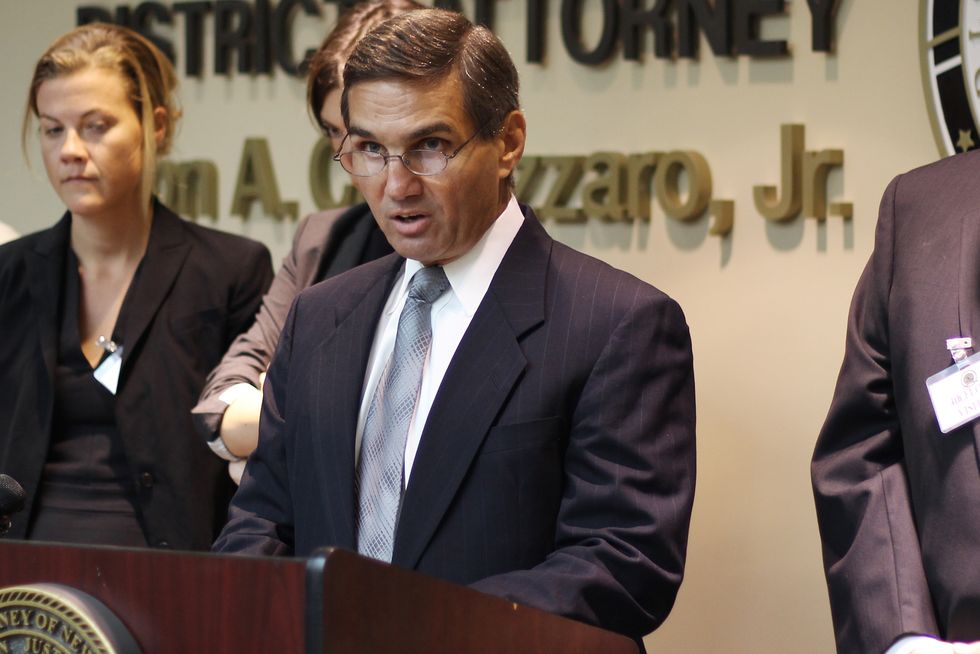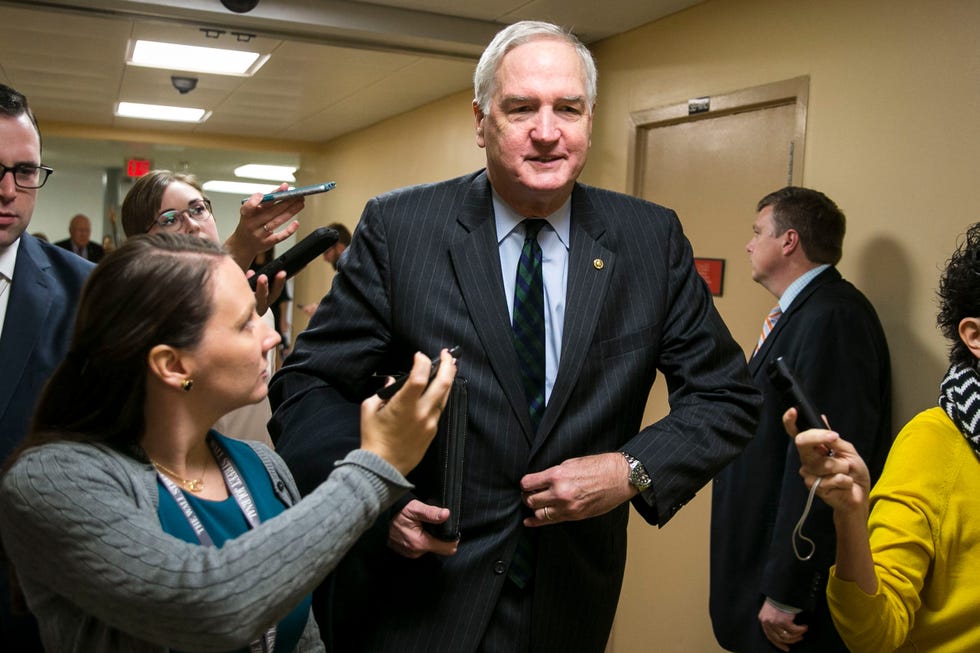(Permanent Musical Accompaniment To This Post)
Being our semi-regular weekly survey of what’s goin’ down in the several states where, as we know, the real work of governmentin’ gets done, and where black crows are in a meadow, sleeping across a broad highway.
We begin in Louisiana, where the real problem isn’t what’s criminal but what’s legal. From The Lens:
The notice came from District Attorney Leon Cannizzaro’s office. His prosecutors are using these fake subpoenas to pressure witnesses to talk to them — a tactic that defense lawyers and legal experts said is unethical, if not illegal. “There’s no question this is improper,” said Pace University law professor Bennett Gershman, a former prosecutor in New York City and an expert in prosecutorial misconduct. “Clearly, it’s unethical because the prosecutor is engaging in fraudulent conduct,” he said. Colin Reingold, an attorney with Orleans Public Defenders, said the practice “borders on fraud or forgery, and certainly I see ethical problems with compelling someone to come in under false pretenses.”
Assistant District Attorney Chris Bowman, who serves as Cannizzaro’s spokesman, defended the use of the documents, which he called “notifications” or “notices.” “The district attorney does not see any legal issues with respect to this policy,” he said. Cannizzaro’s office deals with “an extraordinary number of cases,” he said, including many in which potentially crucial witnesses are reluctant to talk. “Maybe in some places if you send a letter on the DA’s letterhead that says, ‘You need to come in and talk to us,’ … that is sufficient. It isn’t here,” he said. “That is why that looks as formal as it does.” But Wednesday, after The Lens told Bowman that our story would report that legal experts say the practice could be illegal, The New Orleans Advocate reported that the DA’s office had announced it would end the practice.
What the candy-coated hell? We’re so busy that we want to scare the daylights out of people we know we need as witnesses? How does that work? I don’t care who you are. I don’t care if you’re the damn President* of the United States. You see a letter from a prosecutor that says “Subpoena,” and you start looking longingly at flights to Rio. Or maybe Moscow.
We move onto in Mississippi, where we find blessed relief in some traditional and understandable alleged political corruption of the classic sort, a brand of chicanery not involving Volga Bagmen of any kind, and where it’s always…Infrastructure Week! From the Clarion-Ledger:
While the state grapples with how to pay to fix crumbling roads and bridges, the Mississippi Department of Transportation is being politically forced to build a $2-million drive from Lt. Gov. Tate Reeves’ gated neighborhood to a nearby shopping hub. The project is ostensibly for safety of neighborhood motorists, but MDOT records obtained by the Clarion Ledger indicate safety is not the issue and that Reeves' office kept tabs on it while his neighborhood's homeowners association was deeply involved in the project's planning. The new road project comes after Reeves and the Senate forced MDOT to leap-frog $43 million to widen Mississippi 25/Lakeland Drive near his neighborhood over repairs to deteriorated roads and bridges elsewhere across the state. As some lawmakers continue to criticize MDOT as inefficient and lacking priorities for roadwork, the Legislature frequently overrides the agency’s priorities by ordering millions of dollars of pet projects in MDOT’s annual budget legislation.
Good old-fashioned po-litical pulled pork! It’s like a delicious plate from the E&L in Jackson in this poisonous time in our history.
The new road will start near the locked-gate entrances of Oakridge Trail — where Reeves lives — and Dogwood Place subdivisions and end at the Dogwood Festival Market shopping center. The road would not front any current developments and would likely receive little public traffic besides those living in the 130 or so houses in Oakridge and Dogwood. “Yes. Political pressure. From the Legislature,” said MDOT Director Melinda McGrath when asked why the new road is being built. “We would not have done this otherwise.” Normally, MDOT would build such a road only if its other construction had homes or businesses “landlocked” from a major roadway or a development was coming, in which case the developer and/or local government would foot much of the cost. McGrath would not specify from whom the pressure is coming, other than “the Senate side.” McGrath said much of the communication from the Capitol to MDOT on the new road has been verbal. But MDOT communications records indicate staff in Reeves’ lieutenant governor’s office and his neighborhood’s property owners’ association have communicated with MDOT on the project. And Reeves has been unapologetic about pushing for the larger Lakeland Drive widening, of which the new road from his neighborhood is the second and final phase.
Since the CL blew the whistle on this scam—Support Local Reporting!—the Mississippi Department of Transportation has bagged the project temporarily pending “re-evaluation.” I suspect that Lieutenant Governor Tate’s going to have to take the old route to the Piggly Wiggly for the foreseeable future.
Continuing our SEC Media Week of a semi-regular weekly survey, we move along over to Alabama, where, before checking in on our favorite ongoing criminal trial, we discover that local sheriffs are going to have to look elsewhere for pocket money. From The New York Times:
Alabama’s governor has begun to cut off a gravy train for the state’s sheriffs: the unspent money for prisoners’ meals that the sheriffs have long been allowed to keep for themselves. The practice, born of a bickered-over ambiguity in a state law, has let sheriffs pocket tax dollars that over the decades almost certainly ran into the millions. To curtail the practice, Gov. Kay Ivey ordered in a memorandum to the state comptroller that payments of certain funds related to jail food “no longer be made to the sheriffs personally.” Instead, the governor wrote, the money must be paid to county general funds or official accounts. “Public funds should be used for public purposes,” Ms. Ivey, a Republican, said in a statement on Wednesday. “It’s that simple.”
She’s not kidding, either. The grift was strong in these people.
Records show that the sheriff in Etowah County, in northeast Alabama, for example, has taken more than $670,000 in recent years.
Damn.
A later sheriff in Morgan County used unspent jail-food money to invest $150,000 in a used-car dealership. And this year, when the Alabama Media Group described the Etowah County sheriff’s handling of leftover food money, it reported that he had purchased a beach house for $740,000. The sheriff, who said he was acting in accordance with state law and angrily denied wrongdoing, was defeated last month in a primary. He did not respond to a message on Wednesday.
Damn, squared.
Meanwhile, the flames are starting to lick around the ankles of Big Luther Strange, who is having a very bad year, in the trial of Oliver Robinson and executives of the Drummond Company, who are accused of conspiring to mess around with an EPA SuperFund investigation in Robinson’s district. From AL.com:
Last year, I began to suspect that every letter or resolution sent to the EPA had been written by Gilbert. Thanks to the feds, we had proof that Gilbert wrote Robinson's letter and a joint resolution passed by the Alabama Legislature. I wondered, could that have been the case for Strange, too? I submitted a records request to the Alabama Attorney General's office under Alabama's open records law. I asked for all correspondence between that office and Balch & Bingham. Eventually, the Attorney General's office returned some documents. However, none of those documents showed Gilbert had written the letters Strange sent to the EPA. The proof I was looking for wasn't there. But the Attorney General's office had made a mistake. At the bottom of Strange's first letter to the EPA was a series of digits -- document tracking numbers Balch & Bingham used internally to track their work product.It was clear the Attorney General's office was hiding something.I sent a second records request. I didn't hide any cards. I told them why I thought their first response was incomplete and I asked them to send me the rest of the documents I requested.
"After a thorough follow up review of our records, we have determined that this office is not in possession of the correspondence to which you refer," Attorney General Steve Marshall's spokesman, Mike Lewis, wrote. As it would turn out, that was a lie. On the witness stand in federal court this week, Tambling was a reluctant witness. Frequently, he retreated to that old political fallout shelter: "I can't remember." But federal prosecutors had the documents to remind him -- the very documents I had requested from the AG's office. The documents that Lewis said didn't exist. Those documents -- emails and attachments exchanged between Tambling and Gilbert -- show that Gilbert wrote letters to the EPA, Tambling had those letters put on the Attorney General's letterhead, and Strange signed them as his own work.
This, I would point out, is not dissimilar to Scott Pruitt’s cut-and-paste practice back when he was attorney general of Oklahoma. Is there a manual out there that these guys use?
We leave the old Confederacy and take ourselves to Nevada, where they’re having the devil’s own time trying to kill people. From The Nevada Independent:
But while Nevada’s electorate remains firmly supportive of preserving the death penalty and bills to abolish it as recently as last year have gained little traction in the Legislature, it remains infrequently used — a trend stemming from both the cultural peculiarities of the state and the structure of its criminal justice system. With a frequent rate of conviction reversal and virtually all of the executions in the past 40 years coming from people who voluntarily give up their right to appeal and are asking the state to kill them, critics say the system is broken beyond repair.
“This smells a lot of state-assisted suicide,” said Scott Coffee, a Clark County deputy public defender who’s focused on death penalty cases.
The problem with the death penalty in this country is that, given what we like to believe about ourselves as a people, and given what we like to believe about the justice inherent in our laws, sooner or later, the process of execution becomes absurd.
Human rights organization Amnesty International, however, is critical of what it calls the “volunteer phenomenon.” While only about 10 percent of all executions conducted since 1976 have been of volunteers, Nevada’s volunteer rate stands at 92 percent. A handful of states that had been executing high numbers of volunteers decided to scrap the penalty. Connecticut and New Mexico abolished the death penalty in the past decade, and Oregon, Pennsylvania and Washington State have put moratoriums on executions. “The State’s mechanism of execution [is] triggered by an entirely arbitrary factor: the defendant’s decision to acquiesce in his own death,” wrote Justice Stephen Breyer in a 2015 dissenting opinion.
In an interview with the Las Vegas Review-Journal over the weekend, Dozier said he was still holding firm to a desire to die and that “if people say they’re going to kill me, get to it…Life in prison isn’t a life,” he told the newspaper. “This isn’t living, man. It’s just surviving.” The punishment loses meaning at that point, critics say. “It becomes not about who deserves it the most, but who’s most willing to go to the death chamber and that should make us take a hard look at ourselves,” said Coffee. “The easy [answer] is executing more people, but mistakes start getting made.”
The only people Nevada executes are the people who want to die.
Absurd.
And we conclude, as is our custom, in the great state of Oklahoma, where Blog Official Highway Mirage Friedman of the Plains brings us the latest 411 on how that state’s government is messing with the weed, dude. From the Tulsa World:
The Oklahoma Board of Health, by a 5-4 vote on Tuesday, approved a last-minute amendment banning the sale of smokable medical marijuana products at dispensaries — a move that shocked cannabis industry representatives and could lead to legal challenges. Board members, in their Tuesday meeting, also ruled on-site dispensary managers shall be licensed pharmacists who have knowledge of product preparation and dispensing. It was the first public board gathering since voters approved State Question 788 by a double-digit margin on June 26. Julie Ezell, the Department of Health general counsel, emphasized ahead of the rules vote the importance of implementing the measure in accordance with the will of the people to mitigate legal battles. But, she told the board, “it’s within your authority to go a different direction if that’s what you choose to do.”
I think it’s incumbent on all licensed pharmacists in Oklahoma to learn immediately how to bake brownies.
This is your democracy, America. Cherish it.
Respond to this post on the Esquire Politics Facebook page here.

Charles P Pierce is the author of four books, most recently Idiot America, and has been a working journalist since 1976. He lives near Boston and has three children.
















